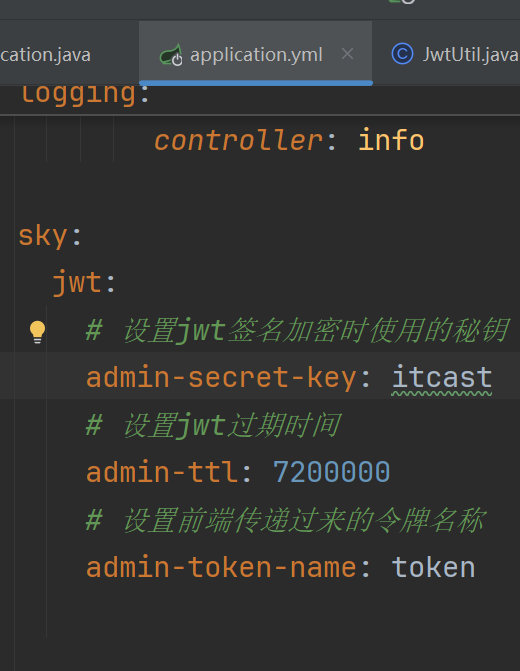文章目录
- 背景
- 第一版配置-查询所有MBean
- 第二版配置-配置白名单
- 第三版配置-增加Cache
- 第四版配置-修改jmx_exorter源码禁用默认jvm导出
- 第五版配置-基于第四版+excludeObjectNameAttributes
- 第六版配置-修改jmx_exorter源码+includeObjectNameAttributes配置
- 基于release-1.0.1分支修改源码
- 更新配置
- jmx-exporter源码解读
- 将改动贡献给jmx_exporter社区
- 生产环境配置建议
背景
在JMX的快速入门与使用+使用JMX Exporter监控+集成OpenTelemetry 博文中当时提出来一个未解决的问题
目前我们遇到的问题是,includeObjectNames本身配置的MBean很少了,但是偶尔还会出现jmx_exporter抓取metrics的时候会长达几十秒甚至一百秒+的情况,目前没找到原因
我们的系统的动态扩容(增加机器)或缩容(减少机器)机制是
- prometheus定时拉取jmx-exporter的数据
- grafana根据prometheus中的数据配置报警规则
- 当触发报警规则时,通过脚本去调用AWS 相关服务的API来实现机器的上线、下线、开机、关机等操作
可以看到上述即使非常依赖于jmx-exporter上报的数据,如果jmx-exporter总是偶尔有超时导致prometheus收集不到数据,那么会严重影响后续脚本的逻辑。(PS: 请不要问我为什么不直接用K8S而是自己实现?问就是emm…现实情况复杂)
当时这个问题一直困扰DevOps组不能解决,且他们缺少Java相关知识。所以找我帮忙看看能不能尝试解决下问题。以下为解决这个问题的过程的思路的全纪录
首先并不是所有服务器都有这种情况,而是具有某种代码类型的服务器,例如:有几台服务器的代码是用来生成报表+定时执行生成报表任务,这种类型的服务器非常容易出现此问题
第一版配置-查询所有MBean
在花了一些时间了解了我们整体的监控架构之后(整体架构在JMX的快速入门与使用+使用JMX Exporter监控+集成OpenTelemetry一文中可以找到),先去查看了Tomcat的日志,发现里面和jmx-exporter agent相关的异常为Broken pipe和Stream is closed,我判断jmx-exporter agent和otel collector的prometheus-receiver之间的连接由于超时断开引发了此异常。
为什么会超时呢?可能有两个原因
- 收集指标太多
- prometheus-receiver配置的超时太短
我查看了产品环境服务器上jmx_exporter的配置文件,发现DevOps的配置很简单
rules:
- pattern: ".*"
查询了所有MBean。还有一个问题,由于我们代码中使用Ehcache,每一个Cache都会注册自己的MBean到JMX中,所以Cache非常多的时候,JMX里的MBean是非常多的。但是我们不关心这些MBean。
所以第一次判断是认为Ehcache 注册的MBean太多,导致查询所有指标很慢
第二版配置-配置白名单
基于上面的分析,我决定使用jmx-exporter中的includeObjectNames,指定我们关心的MBean
includeObjectNames:
- "org.apache.commons.pool2:type=GenericObjectPool,*"
- "tomcat.jdbc:*"
- "Catalina:type=Manager,*"
除了这3个MBean, jvm相关的MBean在 jmx-exporter默认导出且不可配置。见源码
JvmMetrics.builder().register(PrometheusRegistry.defaultRegistry);
第二版配置上去之后,问题依旧
第三版配置-增加Cache
继续看文档和官方Issue+Google, 看到了增加rules的cache减少了jmx-exporter的抓取时间这一文章,修改配置如下
includeObjectNames:
- "org.apache.commons.pool2:type=GenericObjectPool,*"
- "tomcat.jdbc:*"
- "Catalina:type=Manager,*"
rules:
- pattern: 'org.apache.commons.pool2<type=GenericObjectPool, name=(\w+)><>(NumActive)'
cache: true
- pattern: 'tomcat.jdbc<name=\"\w+/\w+\", .*><>(NumActive)'
cache: true
- pattern: 'Catalina<type=Manager,.*><>(activeSessions)'
cache: true
并增加了prometheus-receiver的抓取超时时间
receivers:
prometheus:
config:
scrape_configs:
- job_name: 'otel-collector'
scrape_interval: 30s
scrape_timeout: 29s
static_configs:
- targets: ['127.0.0.1:12345']
第三版配置上去之后,问题依旧
第四版配置-修改jmx_exorter源码禁用默认jvm导出
既然还是超时,我认为问题可能出在jvm本身收集的指标太多了,一旦jvm负载较高,有可能增加查询MBean的时间,我决定直接将源码中JavaAgent的 JvmMetrics.builder().register(PrometheusRegistry.defaultRegistry);直接注释掉,然后修改配置如下
includeObjectNames:
- "org.apache.commons.pool2:type=GenericObjectPool,*"
- "tomcat.jdbc:*"
- "Catalina:type=Manager,*"
- "java.lang:type=Memory"
- "java.lang:type=Threading"
rules:
- pattern: 'org.apache.commons.pool2<type=GenericObjectPool, name=(\w+)><>(NumActive)'
cache: true
- pattern: 'tomcat.jdbc<name=\"\w+/\w+\", .*><>(NumActive)'
cache: true
- pattern: 'Catalina<type=Manager,.*><>(activeSessions)'
cache: true
- pattern: 'java.lang<type=Memory><HeapMemoryUsage>(used|max)'
cache: true
name: jvm_memory_$1_bytes
type: GAUGE
help: $1 (bytes) of a given JVM memory area
labels: {"area":"heap"}
- pattern: 'java.lang<type=Threading><>ThreadCount'
cache: true
type: GAUGE
help: Current thread count of a JVM
name: jvm_threads_current
通过name兼容原来源码中导出的jvm参数名字
第四版配置上去之后,问题依旧
第五版配置-基于第四版+excludeObjectNameAttributes
到了这一步,我还是没有深入看过jmx-exporter源码。在文档中看到了excludeObjectNameAttributes参数,于是将MBean中不关心的Attribute都配置上。在这一版的配置中,我没有将所有的MBean的不关心的Attribute都配置上,仅配置了jvm相关的MBean和部分MBean,主要是拿这一版的配置来验证下我的猜想。看看到底是不是jvm的某个MBean的某个属性导致的查询慢,修改配置如下
# for the metrics of the jvm itself, we don't have to declare them, they are automatically exported, see https://groups.google.com/g/prometheus-users/c/2WTZn5Vi4FE
includeObjectNames:
- "java.lang:type=Memory"
- "java.lang:type=Threading"
- "org.apache.commons.pool2:type=GenericObjectPool,*"
- "tomcat.jdbc:*"
- "Catalina:type=Manager,*"
excludeObjectNameAttributes:
"java.lang:type=Memory":
- "ObjectPendingFinalizationCount"
- "NonHeapMemoryUsage"
- "Verbose"
- "ObjectName"
"java.lang:type=Threading":
- "ThreadAllocatedMemorySupported"
- "ThreadAllocatedMemoryEnabled"
- "CurrentThreadAllocatedBytes"
- "ThreadContentionMonitoringEnabled"
- "ThreadContentionMonitoringSupported"
- "CurrentThreadCpuTimeSupported"
- "ObjectMonitorUsageSupported"
- "SynchronizerUsageSupported"
- "ThreadCpuTimeEnabled"
- "TotalStartedThreadCount"
- "AllThreadIds"
- "CurrentThreadCpuTime"
- "CurrentThreadUserTime"
- "ThreadCpuTimeSupported"
- "PeakThreadCount"
- "DaemonThreadCount"
- "ObjectName"
# using cache parameters to increase performance, note that this parameter only caches bean name expressions to rule computation and not cache metrics. see https://github.com/prometheus/jmx_exporter/tree/release-1.0.1/docs
rules:
- pattern: 'java.lang<type=Memory><HeapMemoryUsage>(used|max)'
cache: true
name: jvm_memory_$1_bytes
type: GAUGE
help: $1 (bytes) of a given JVM memory area
labels: {"area":"heap"}
- pattern: 'java.lang<type=Threading><>ThreadCount'
cache: true
type: GAUGE
help: Current thread count of a JVM
name: jvm_threads_current
- pattern: 'org.apache.commons.pool2<type=GenericObjectPool, name=(\w+)><>(NumActive)'
cache: true
- pattern: 'tomcat.jdbc<name=\"\w+/\w+\", .*><>(NumActive)'
cache: true
- pattern: 'Catalina<type=Manager,.*><>(activeSessions)'
cache: true
第五版配置上去之后,问题依旧,不过这次能看到超时时间jmx_scrape_duration_seconds降低了,但是超时频率增加了。
这一版验证了两个猜想
- 不是jvm本身的MBean查询引起的超时
- 排除掉不需要的MBean属性能够降低
jmx_scrape_duration_seconds时间
关键的问题:到底是哪个MBean的哪个属性导致的呢?范围已经缩小到3个MBean了
第六版配置-修改jmx_exorter源码+includeObjectNameAttributes配置
既然范围已经缩小到3个MBean了,我为什么不继续增加excludeObjectNameAttributes配置调查下去呢?因为我觉得,这种配置太麻烦了,如果以后我新监控一个MBean的Attribute,且这个MBean有几百个Attribute,那加这个规则岂不是要累死。所以我决定,修改源码,让jmx-exporter只查我声明的Attribute。在看了源码之后,改动如下
基于release-1.0.1分支修改源码
- 在
io.prometheus.jmx.ObjectNameAttributeFilter类中做如下改动
public static final String INCLUDE_OBJECT_NAME_ATTRIBUTES = "includeObjectNameAttributes";
private final Map<ObjectName, Set<String>> includeObjectNameAttributesMap;
private ObjectNameAttributeFilter() {
excludeObjectNameAttributesMap = new ConcurrentHashMap<>();
includeObjectNameAttributesMap = new ConcurrentHashMap<>();
}
在io.prometheus.jmx.ObjectNameAttributeFilter#initialize方法中新增
if (yamlConfig.containsKey(INCLUDE_OBJECT_NAME_ATTRIBUTES)) {
Map<Object, Object> objectNameAttributeMap =
(Map<Object, Object>) yamlConfig.get(INCLUDE_OBJECT_NAME_ATTRIBUTES);
for (Map.Entry<Object, Object> entry : objectNameAttributeMap.entrySet()) {
ObjectName objectName = new ObjectName((String) entry.getKey());
List<String> attributeNames = (List<String>) entry.getValue();
Set<String> attributeNameSet =
includeObjectNameAttributesMap.computeIfAbsent(
objectName, o -> Collections.synchronizedSet(new HashSet<>()));
attributeNameSet.addAll(attributeNames);
for (String attribueName : attributeNames) {
attributeNameSet.add(attribueName);
}
includeObjectNameAttributesMap.put(objectName, attributeNameSet);
}
以及增加
public boolean include(ObjectName objectName, String attributeName) {
boolean result = false;
if (includeObjectNameAttributesMap.size() > 0) {
Set<String> attributeNameSet = includeObjectNameAttributesMap.get(objectName);
if (attributeNameSet != null) {
result = attributeNameSet.contains(attributeName);
}
}
return result;
}
- 在
io.prometheus.jmx.JmxScraper#scrapeBean方法中增加一行
if (objectNameAttributeFilter.include(mBeanName, mBeanAttributeInfo.getName())) {
name2MBeanAttributeInfo.put(mBeanAttributeInfo.getName(), mBeanAttributeInfo);
}
更新配置
includeObjectNames:
- "java.lang:type=Memory"
- "java.lang:type=Threading"
- "org.apache.commons.pool2:type=GenericObjectPool,*"
- "tomcat.jdbc:*"
- "Catalina:type=Manager,*"
includeObjectNameAttributes:
"Catalina:type=Manager,host=localhost,context=/替换为真正的xxx":
- "activeSessions"
"java.lang:type=Memory":
- "HeapMemoryUsage"
"java.lang:type=Threading":
- "ThreadCount"
"org.apache.commons.pool2:type=GenericObjectPool,name=替换为真正的xxx":
- "NumActive"
"tomcat.jdbc:name=\"jdbc/替换为真正的xxx\",type=ConnectionPool,class=org.apache.tomcat.jdbc.pool.DataSource":
# using cache parameters to increase performance, note that this parameter only caches bean name expressions to rule computation and not cache metrics. see https://github.com/prometheus/jmx_exporter/tree/release-1.0.1/docs
rules:
- pattern: 'java.lang<type=Memory><HeapMemoryUsage>(used|max)'
cache: true
name: jvm_memory_$1_bytes
type: GAUGE
help: $1 (bytes) of a given JVM memory area
labels: {"area":"heap"}
- pattern: 'java.lang<type=Threading><>ThreadCount'
cache: true
type: GAUGE
help: Current thread count of a JVM
name: jvm_threads_current
- pattern: 'org.apache.commons.pool2<type=GenericObjectPool, name=(\w+)><>(NumActive)'
cache: true
- pattern: 'tomcat.jdbc<name=\"\w+/\w+\", .*><>(NumActive)'
cache: true
- pattern: 'Catalina<type=Manager,.*><>(activeSessions)'
cache: true
将新的jar包以及配置应用到产品环境之后,只抓取几个Attribute的时间只有0.000xxx秒,这才是我们想要的速度和效果。终于把这个问题给解决了。
jmx-exporter源码解读
在改源码以及排查问题过程中,把jmx-exporter的源码看了一遍,其关键流程如下
-
使用maven-shade-plugin设置agent的入口点

一个Agent的入口点的类中需要包括premain方法,关于如何写一个Java Agent,感兴趣的可以自行Google,这里不做过多解释 -
入口点JavaAgent类,主要是将要抓取的指标注册到PrometheusRegistry.defaultRegistry然后启动

-
createHTTPServer最底层方法
io.prometheus.metrics.exporter.httpserver.HTTPServer#HTTPServer,核心在于MetricsHandler
-
在
io.prometheus.metrics.exporter.common.PrometheusScrapeHandler#handleRequest方法负责实际的请求
-
scrape的底层方法

负责真正的MBean查询。Collector接口的实现类是查询JVM各种MBean的类,例如JvmMetrics >JvmThreadsMetrics,这些实现类都会调用io.prometheus.metrics.model.registry.PrometheusRegistry#register(io.prometheus.metrics.model.registry.Collector)添加到collectors中; MultiCollector的实现类是JmxCollector,负责其他MBean的查询。关于Registry可参考prometheus官方java客户端文档 -
这里重点关注下MultiCollector的collect方法

-
doScrape的最终底层方法

这就是关键位置,这些步骤都是在JMX快速入门博文里提到的查询MBean方法,后面折叠起来的代码部分,是将查询出来的Attribute格式化为prometheus格式,感兴趣的可以看下源码。
以上就是jmx-exporter agent的处理请求的完整流程,感兴趣的可以看看jmx-exporter源码。
将改动贡献给jmx_exporter社区
解决了这问题之后,我觉得这个新增配置对于一些场景还是有用的,于是我决定将新增的includeObjectNameAttributes配置贡献给社区。
该PR的状态可在这里查看
生产环境配置建议
如果你们生产环境没有出现我遇到的问题,建议使用第三版配置即可。如果也遇到了和我一样的问题,建议使用最后一版配置并确保当前使用的jmx-exporter的release版本包含了我的PR



















